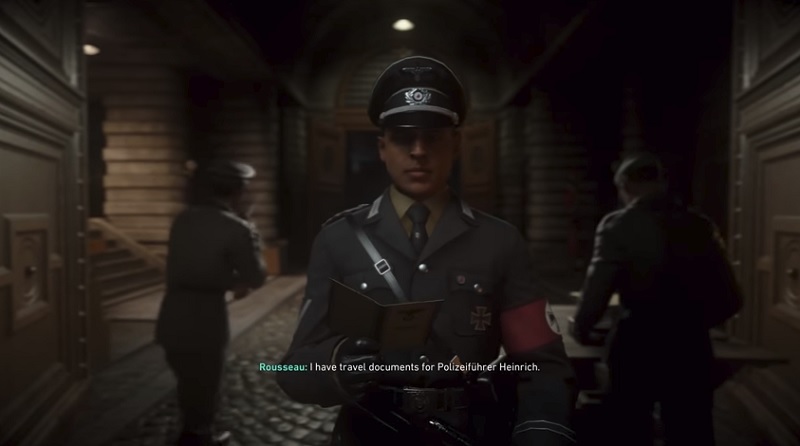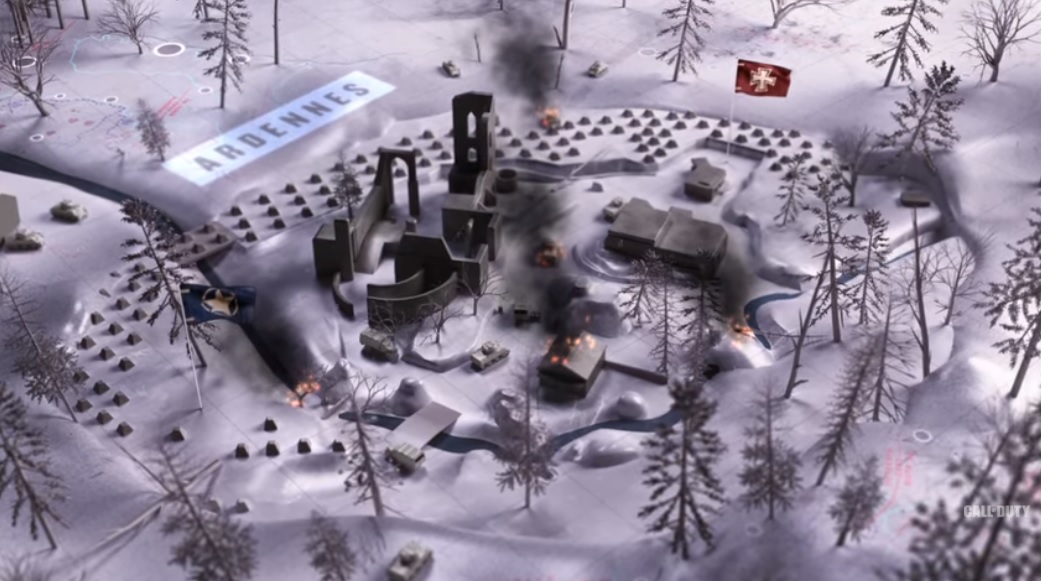What you won’t like
History could have played a bigger role

Above: The D-Day landing in Call of Duty: WWII.
There are small moments when Sledgehammer Games could have passed on a history lesson to a younger generation, and it didn’t. When you land on Omaha Beach on June 6, 1944, the caption reads, “Normandy Beaches.” Why doesn’t it just say Omaha Beach, which carries a more impactful historical significance to the people who know their history?
I love history, and I wish everybody shared that passion. This game seems like it might be the only history lesson that many people will get. I appreciate how much time and effort they put into the research. But Sledgehammer could have gone deeper, embedding more of that history in more places in the game.
By contrast, Assassin’s Creed Origins is chock full of educational lessons about Ancient Egypt. Sledgehammer Games developers say they had to balance educational history with fun. They wanted to entertain us with a video game. But I think the pendulum swung too far to fun. I feel there could have been more impact and weight from the full force of history. At the end of the D-Day mission, Sledgehammer moves on without giving context about how many soldiers sacrificed their lives in the battle that you just survived.
June 5th: The AI Audit in NYC
Join us next week in NYC to engage with top executive leaders, delving into strategies for auditing AI models to ensure fairness, optimal performance, and ethical compliance across diverse organizations. Secure your attendance for this exclusive invite-only event.
There isn’t much of a villain

Above: The French Resistance mission requires stealth.
Previous Call of Duty games had memorable villains like Raul Menendez in Call of Duty: Black Ops II or Kevin Spacey’s Jonathan Irons in Call of Duty: Advanced Warfare.
But this game never really takes you inside the minds of the Nazi villains. You encounter evil Nazi commanders like one who is trying to sort through the prisoners of war to find Jews, or another who oppresses the conquered French population in Paris. But they have small roles in the game and don’t make a lasting impression. They aren’t at all like the memorable evil characters in Inglorious Basterds or Wolfenstein II: The New Colossus.
The result is that you have a grand cause to fight the Nazi oppression, but you don’t have a personal cause to take revenge against anyone. In some ways, this is a good thing. The game teaches you the horrors of war, but it doesn’t teach you to hate the German people. The soldiers even have a conversation about this lesson during a quiet moment, drawing a line between ordinary people and Nazi ideology. You learn what the Nazis did, particularly how they treated the Jews and the prisoners of war. Still, I worry this game won’t be as memorable because it doesn’t have a super villain.
The mismatched tones of the campaign and multiplayer modes

Above: The Ardennes map in Call of Duty: WWII.
The serious tone of the single-player campaign isn’t carried on into the multiplayer combat. That destroys some of the immersion.
The single-player campaign makes you feel like you are on one of the greatest endeavors of mankind. With multiplayer, you show up at the Headquarters location on Omaha Beach, and the officer who greets you talks about — your multiplayer career. You can request supply drops of loot that coming falling from the sky. It breaks the idea that you are part of history, and you are just trying to survive or help bring your buddies back home.
Instead, it suggests the awkward notion that you could be the next esports hero or compete better against other players. To me, that’s a mismatch which could have been addressed in some way. The transition to Nazi Zombies isn’t as awkward, as the story leads you on a serious exploration of Nazi science and its obsession with the occult. The tone mismatch raises the question. Is this an esports vehicle, or a story that carries the gravity of history?
Conclusion

Above: Flamethrower in Call of Duty: WWII
Eric Hirshberg, CEO of Activision Publishing, told me in an interview in June that Activision may have stayed with science fiction for a year too long with last year’s Call of Duty: Infinite Warfare, and that everybody agreed that going back to World War II was a good idea.
I think so too. Call of Duty games are as big as they come. Activision has the luxury of having three studios making them, giving them three years to complete each title — not to mention the team dedicated to multiplayer. That’s as big an investment as anyone makes in a single video game franchise. And in the case of Call of Duty: WWII, it really pays off. My hat’s off to the developers at Sledgehammer who are helping a new generation understand the sacrifices of those who died in the Second World War.
I’ve brought up a few things I didn’t like. But they are relatively small blemishes when you think about the whole game. Multiplayer is better because of War mode and the slowing of the superhuman speeds. Nazi Zombies has roots in the Nazi interest in the occult. And the single-player campaign follows a squad with characters that you care about through a sweeping journey through some of the most epic battles of the war. Each battle is intense, and the attention to details of the imagery — like the quality of the water in a stream running through a forest — is amazing. It’s an authentic Call of Duty.
Some people think it’s trite and repetitive to hear all this talk about history and sacrifice. But I look around at the world today — which still has people who espouse the Nazi ideology — and I feel like we still need to learn. The ending of WWII takes us into the Nazi prison camps, and the scenes of atrocity are a grim reminder of where that ideology leads. It is a fitting ending, which resonates with many of the eariler scenes in the game, and it’s a personal one at that.
Score: 94/100
Call of Duty: WWII is available now for PC, Xbox One, and Playstation 4. The publisher provided GamesBeat with a copy of PS4 edition of the game for this review, and I attended a review event.


